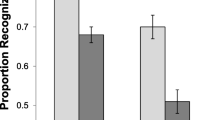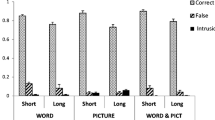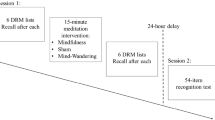Abstract
The present study investigated differences in false memory production between men and women, using the Deese/Roedgier McDermott (DRM) paradigm. Five word lists were used (MAN, GIRL, BREAD, BLACK, HIGH) and it was predicted that males would produce more false memories for the MAN word list while females will produce more false memories for the GIRL word list. Results did not confirm our predictions. Gender was neither a significant main effect, nor did it interact with any factors. Test and List x Test were the only significant main or interaction effects, respectively. Results are discussed as they relate to gender differences in cognitive processing.
Similar content being viewed by others
References
Banaji, M.R., & Hardin, CD. (1996). Automatic stereotyping. Psychological Science, 7, 136–141.
Clancy, S., Schacter, D., McNally, R., & Pitman, R. (2000). False recognition in women reporting recovered memories of sexual abuse. Psychological Science, 11, 26–31.
Deese, J. (1959). On the prediction of occurrence of particular verbal intrusions in immediate recall. Journal of Experimental Psychology, 60, 656–674.
deMayo, R. M., & Diliberto, K. A. (2003). False memory for pictures of common household stereotypes: Evidence of a gender stereotype. Psi Chi Journal of Undergraduate Research, 8, 62–69.
Feingold, A. (1988). Cognitive gender differences are disappearing. American Psychologist, 43, 95–103.
Ferraro, F.R., & Chelminski, I. (1996). Preliminary normative data on the Geriatric Depression Scale-Short Form (GDS-SF) in a young adult sample. Journal of Clinical Psychology, 52, 443–447.
Halpem, D. (1989). The disappearance of cognitive gender differences: What you see depends on where you look. American Psychologist, 44, 1156–1157
Halpern, D., & Ikier, S. (2001). Causes, correlates, and caveats: Understanding the development of sex differences in cognition. The development of sex differences in cognition. Westport, CT: Ablex Publishing.
Halpem, D. & LaMay, M. (2000). The smarter sex: A critical review of sex differences in intelligence. Educational Psychology Review, 12, 229–246.
Herlitz, A., Nilsson, L.G., & Backman, L. (1997). Gender differences in episodic memory. Memory & Cognition, 25, 801–811.
Hyde, J.S. (2004). Half the human experience: The psychology of women (6th Ed.). Boston, MA: Houghton Mifflin Co.
Lenton, A., Blair, I., & Hastie, R. (2001). Illusions of gender: Stereotypes evoke false memories. Journal of Experimental Social Psychology, 37, 3–14.
Roediger, H., & McDermott, K. (1995). Creating false memories: Remembering words not presented in lists. Journal of Experimental Psychology: Learning, Memory, and Cognition, 21, 803–814.
Roediger, H., Watson, J., McDermott, K., & Gallo, D. (2001). Factors that determine false recall: A multiple regression analysis. Psychonomic Bulletin & Review, 8, 385–407.
Seamon, J.G., Guerry, J. D., Marsh, G. P., & Tracy, M. C. (2002). Accurate and false recall in the Deese/ Roediger and McDermott procedure: A methodological note on sex of participant. Psychological Reports, 91, 423–427.
Spielberger, CD., Gorsuch, R.L., Lushene, R., Vagg, P.R., & Jacobs, G.A. (1971). Manual of the State-Trait Anxiety Inventory (Form Y). New York: Psychological Corporation.
Swim, J.K., & Sanna, L.J. (1996). He’s skilled, she’s lucky: Ameta-analysis of observers’ attributions for women’s and men’s successes and failures. Personality and Social Psychology Bulletin, 22, 507–519.
Wechsler, D.J. (1981). Manual: Wechsler Adult Intelligence Scale: Vocabulary Test (WAIS-R). New York: Psychological Corporation.
Winograd, E., Peluso, J., & Glover, T. (1998). Individual differences in susceptibility to memory illusions. Applied Cognitive Psychology, 12, S5-S27.
Author information
Authors and Affiliations
Rights and permissions
About this article
Cite this article
Bauste, G., Ferraro, F.R. Gender differences in false memory production. Curr Psychol 23, 238–244 (2004). https://doi.org/10.1007/s12144-004-1023-0
Issue Date:
DOI: https://doi.org/10.1007/s12144-004-1023-0




